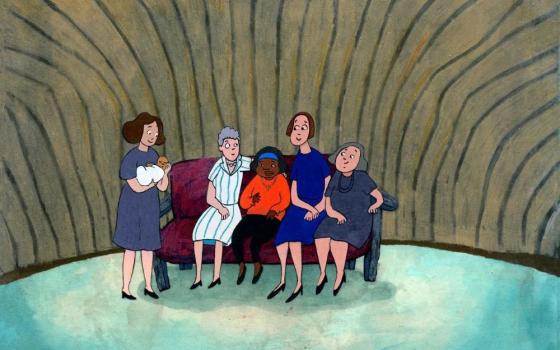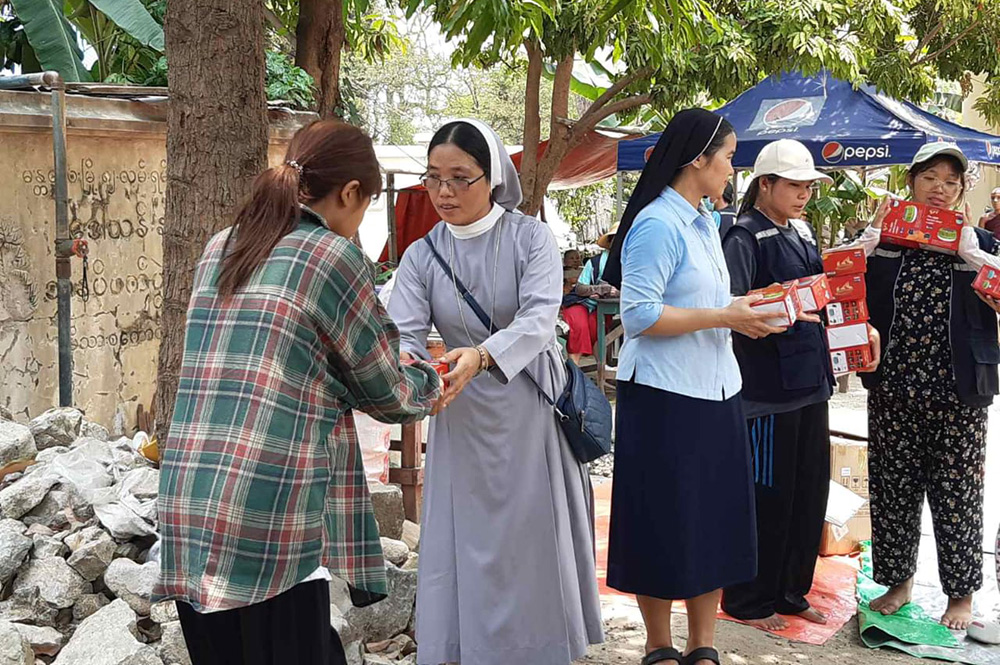
Catholic nuns distribute relief materials to the victims of a 7.7 magnitude earthquake in Mandalay, Myanmar. (Courtesy of Melanie Mai Chit Yin)
Catholic nuns engaged in rehabilitation efforts say Myanmar continues to struggle without food, shelter and medicines several months after a massive earthquake shook the Southeastern nation. Ongoing civil unrest has further complicated the sisters' work.
"Myanmar is like an isolated country with everyone feeling insecure and frightened with repeated natural calamities and civil unrest," said Servite Sr. Josy Mary, whose congregation has been involved in humanitarian works since the March 28 earthquake.
The 7.7 magnitude earthquake hit the central Myanmar region, especially Mandalay, and killed more than 3,700 people, wounded more than 5,000 and displaced thousands, according to the International Committee of the Red Cross. Neighboring Thailand also reported casualties and damage to its buildings.
"More than 140 aftershocks of various magnitudes occurred in the past month that affected rescue operations," said Mary, her congregation's Myanmar provincial, based in Yangon, the nation's capital.
She added that several churches, convents and Catholic Church institutions destroyed in the earthquake require rebuilding.
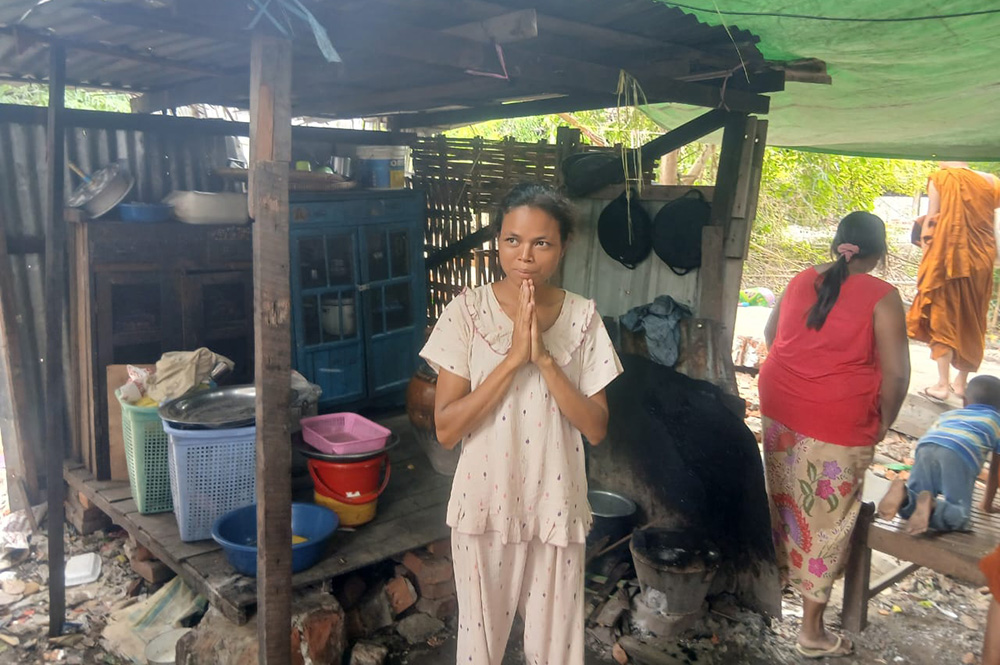
A Myanmar woman who lost her house in the earthquake thanks Catholic nuns for their consolation and support. (Courtesy of Melanie Mai Chit Yin)
Myanmar has more than 135 ethnic groups and shares borders with Bangladesh, China, India, Laos and Thailand. Buddhism is the major religion, with Muslims and Christians as minority communities. There are nearly 700,000 Catholics out of the total population of 54 million.
Mary said the church is involved in rehabilitation programs, though with limitations and challenges.
According to the United Nations, more than 4.3 million people urgently need clean water and sanitation, as the earthquakes severely damaged water systems, damaged over 789 hospitals and damaged or destroyed 52,000 homes.
Hospitals in Mandalay, Magway, Nay Pyi Taw and Sagaing struggle to provide medical support to injured people, and affected areas are also experiencing extremely high temperatures.
In Sagaing Township, more than 70% of structures have sustained significant damage, including the destruction of the bridge connecting Sagaing and Mandalay.
Servite Sr. Melanie Mai Chit Yin lives in Mandalay and coordinates relief activities. She told Global Sisters Report that most disaster management teams from other countries have left after the initial wave of relief services, and only some UN-affiliated agencies and church groups are still in the field.
The nun said that political instability in Myanmar has severely affected humanitarian aid and the flow of funds. "The global community has almost forgotten about the struggle we are passing through," Yin said.
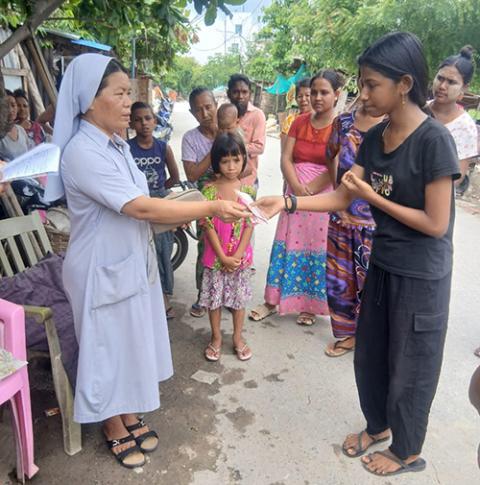
Sr. Melanie Mai Chit Yin during her field visits to console women and children who were the most affected victims of a 7.7 magnitude earthquake that hit Myanmar on March 28. (Courtesy of Sr. Mary Jose)
She said women and children are the hardest hit as safety and security are uncertain. "Gender-based violence against women and children are widely reported," she said.
Yin also serves as a counselor to traumatized women and children in Mandalay. "People are living in small huts on [the] roadside, which are not safe," said the nun whose convent was partially destroyed in the earthquake.
She said her congregation initiated a project to build temporary shelters for the most vulnerable population with the support of church-based NGOs in India. The Claretians and their social wing, the Hope Society, are helping the Servite Sisters build temporary shelters for the affected.
Claretian Fr. George Kannanthanam, the founder-director of the Hope Society, told GSR that his congregation aims to build at least 200 shelters. "We hope to do more as many volunteers are willing to support the project," he added.
Kannanthanam said four Claretian provinces in India and the Hope Society raised funds for Myanmar for the project to be implemented by the Servite Sisters.
Yin said they have provided more than 30 tents, costing around $200 each. "The government has allotted some lands and camps for the affected people in faraway places, but locals prefer to stay near their own homes," said the nun, who builds tents near destroyed homes and properties of their beneficiaries.
She said about 10 women's congregations and some men's congregations based in Mandalay are involved in relief and rehabilitation tasks but work in isolation. "We concentrate on shelter, and they work on other basic needs like food and medicine," Yin added.
Advertisement
The Servite Sisters provincial explained that unified action is difficult because of government restrictions, and each congregation does what it can. "So, we work in a lowkey mode but cover people of all faiths," she added.
Mary said her nuns have also collaborated with Buddhist monks. "Usually, a Buddhist monk accompanies our sisters when they work with their communities," she added.
Meanwhile, the ongoing civil unrest and ethnic conflicts continue to affect humanitarian efforts.
"The ethnic conflicts and civil war have killed more people than the earthquakes and displaced millions," said Mary, who observed a slow pace of foreign aid to Myanmar due to political reasons.
"Since the military government came into power in 2021, at least 5,350 civilians have been killed and more than 3.3 million displaced," she said, quoting UN agencies.
Affected people, especially women and children, require mental health support. "We have only a few trained professionals to do this task," the provincial said.
Her congregation has formed some women and children groups who are given therapy, games and various activities. "Another priority is to prepare, motivate and [return] children to schools in June, and they require books, uniforms, shoes and other basic needs," Yin said.
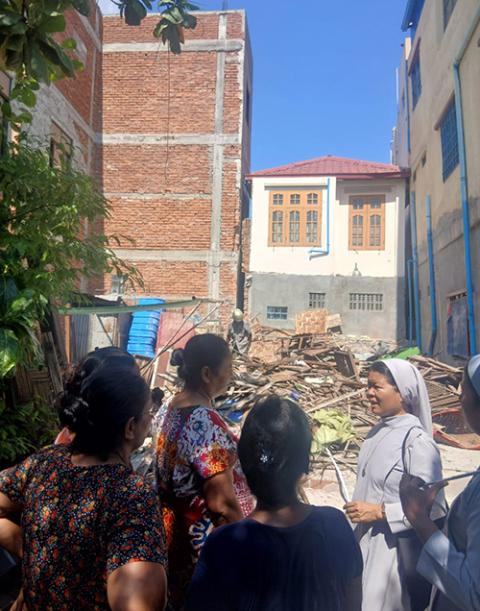
Sr. Melanie Mai Chit Yin skipped repairing her convent, which was destroyed in the earthquake, and engaged in full-time work among the people affected by the earthquake in Mandalay, Myanmar. (Courtesy of Mary Jose)
On May 20, Yin visited a Buddhist camp in a school building where approximately 245 people were sheltered. However, they were asked to vacate the camp by May 25, as the government wanted to open the school in June.
"We have no place to go, and we are sick," said Daw Thida Oo, the mother of a son suffering from an unspecified lung disease.
Yin gave her 10,000 Kyat [US$5] and some household items. "It is a big help at this moment," the Buddhist woman said.
Catholic aid organizations such as Caritas and Jesuit Refugee Service and Protestant groups such as the Adventist Development and Relief Agency and the Methodist Church are involved in rehabilitation.
Mary said that Caritas has conducted need assessment studies and supplied fortified biscuits, high-energy packs, dried noodles, tarpaulins, blankets, mosquito nets, kitchen sets, clean water, hygiene kits and cash assistance.
"As monsoon [season] fast approaches, shelter is an essential requirement for people, and we request more volunteers to help us reach out to the homeless people," she said.
Meanwhile, Cardinal Charles Maung Bo, head of the Catholic Church in Myanmar, has called for a ceasefire to facilitate unimpeded humanitarian assistance to victims of the devastating earthquake.
"Such a ceasefire is imperative to address the immediate need for food, medical supplies, shelter and protection for those affected by both the earthquake and the prolonged conflict," said Bo, president of the Catholic Bishops' Conference of Myanmar.





